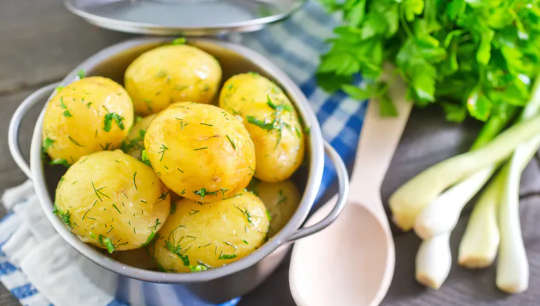 The cooked starches in potatoes can be good for our microbiome. Gayvoronskaya_Yana/ Shutterstock
The cooked starches in potatoes can be good for our microbiome. Gayvoronskaya_Yana/ Shutterstock
The humble potato has been given a bad rap. What was once a cheap staple of many countries’ diets has instead been branded in recent years an “unhealthy” food best avoided.
Eating too much of any type or group of food (like carbohydrates) isn’t healthy, and some research suggests eating too many potato products in particular might be associated with higher blood pressure. But it’s typically the way we prepare and consume potatoes (like frying them) that cause negative effects.
In fact, potatoes contain a lot of vitamins and other nutrients that are important for health. Here’s six reasons why potatoes are good for you.
1. Vitamin C
People typically associate vitamin C with oranges and citrus fruit. But an important source of vitamin C in British diets for most of the 20th century actually came from potatoes. On average, a small (150g) potato provides us with about 15% of our daily vitamin C.
Get The Latest By Email
Vitamin C is important as not only does it support immune function and contain antioxidants, it plays an essential role in forming connective tissue, which helps our joints work – and holds our teeth in place. This is why vitamin C deficiency (scurvy) is linked to teeth falling out.
2. Vitamin B6
Vitamin B6 is an essential co-factor (a small molecule) in the body. It helps over 100 enzymes in the body function properly, allowing them to break down proteins – a process key to good nerve function. This may also be why B6 is linked to good mental health.
Typically, a small potato will contain around a quarter of an adult’s recommended daily intake of B6.
3. Potassium
Having potassium in our cells is important for regulating the electrical signalling in muscles and nerves. So, if potassium gets too high or low, it can stop our heart working.
Roast, baked and fried potatoes contain higher levels of potassium than boiled or mashed potatoes, with a jacket potato containing around a third of the recommended daily intake. This is because boiling diced potatoes can cause around half of the potassium to leak out into the water.
However, people with kidney disease – which can limit the ability to remove excess potassium from the body – may need to limit the number of potatoes they eat. And if you do roast or fry your potatoes, be careful how much oil you use.
4. Choline
Choline is a small compound which attaches to fat to make phospholipids, the buildings blocks of cell walls, as well as the neurotransmitter acetylcholine (which helps us contract muscles, dilate blood vessels, and slow heart rate). Potatoes contain the second highest levels of choline, next to protein-rich foods, like meat and soya.
It’s vital to consume enough choline as it’s essential for a healthy brain, nerves, and muscles. And subtle differences in our genes may mean some of us are naturally more deficient in making choline. A jacket potato contains around 10% of a person’s daily choline requirements. Choline is particularly important in pregnancy, as the growing baby is making lots of new cells and organs.
5. Good for our stomach
Cooking and cooling potatoes before eating them allows resistant starch to form. This healthy starch helps our bodies in many ways, including by acting as a prebiotic (which are important for a healthy gut microbiome).
The cooling of fluffy, cooked starches causes them to collapse. While this actually makes them harder to digest, this means that the bacteria in our colon then ferments them, producing compounds similar to vinegar called short-chain fatty acids. These fatty acids nourish our guts and keep it healthy.
Short-chain fatty acids can also alter our metabolism in a good way, helping lower blood fat and blood sugar levels. This – together with their high water and low-fat content – makes boiled and steamed potatoes a low calorie, nutrient dense and filling food.
6. Naturally gluten free
Potatoes are also naturally gluten free, so are a great option for people with coeliac disease or who need to avoid gluten.
The same is true for sweet potatoes, which also have a lower glycaemic index – which means they don’t cause a sharp spike in blood sugar, which may help control weight and appetite. However, sweet potatoes are slightly higher in calories and carbohydrates than regular potatoes – though they contain more beta carotene (a form of vitamin A).
Potatoes on your plate
Some people may choose to avoid potatoes due to concerns about weight gain – but a typical boiled potato is only around 130 calories, which is actually fewer calories than a banana of the same size. But it’s important to remember how potatoes are prepared and what they’re eaten with.
Boiling or steaming (possibly with cooling to increase the resistant starch) is the best way to keep the number of calories per gram low. Baking will increase calories per gram (as water is lost), as can mashing with butter or cream. The least healthy way to eat potatoes is as chips or crisps, as they soak up oil like a sponge.
You’ll also want to avoid green potatoes. This happens when the potato has been stored in light and produces a toxin which can irritate our gut. Otherwise, for most people including potatoes as part of a healthy and varied diet may actually be a good thing.
And alongside being healthy, potatoes also have environmental advantages. They require less water than rice to produce, and less greenhouse gases than both rice and wheat – which may be yet another good reason to include potatoes in your diet.![]()
About The Author
Duane Mellor, Associate Dean Education - Quality Enhancement,, Aston University
books_food
This article is republished from The Conversation under a Creative Commons license. Read the original article.







